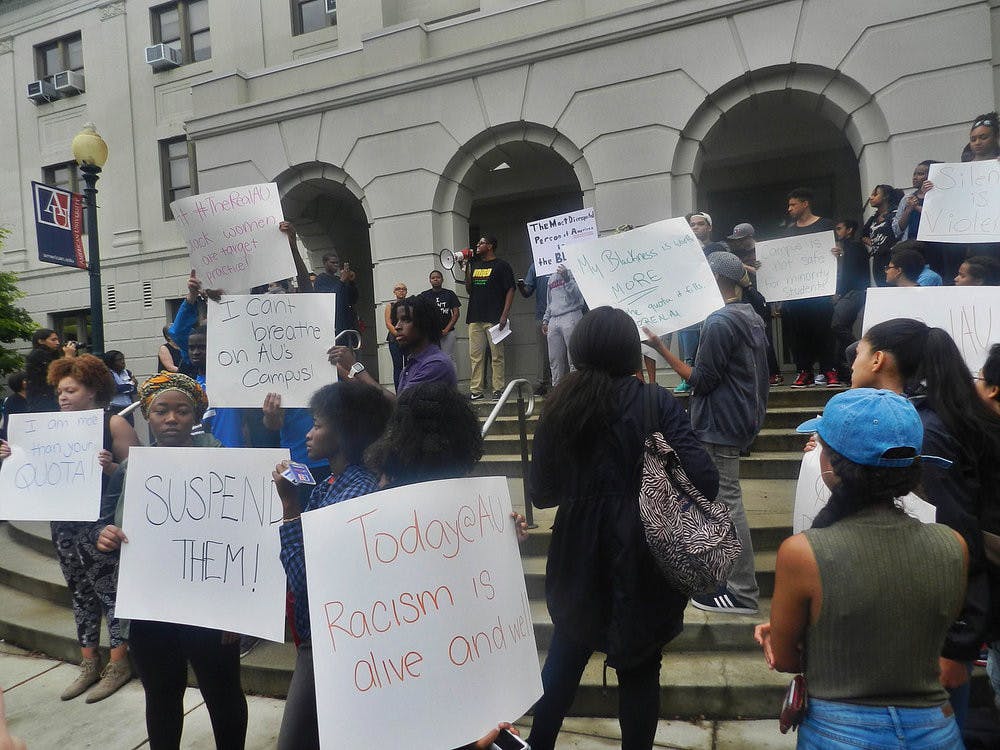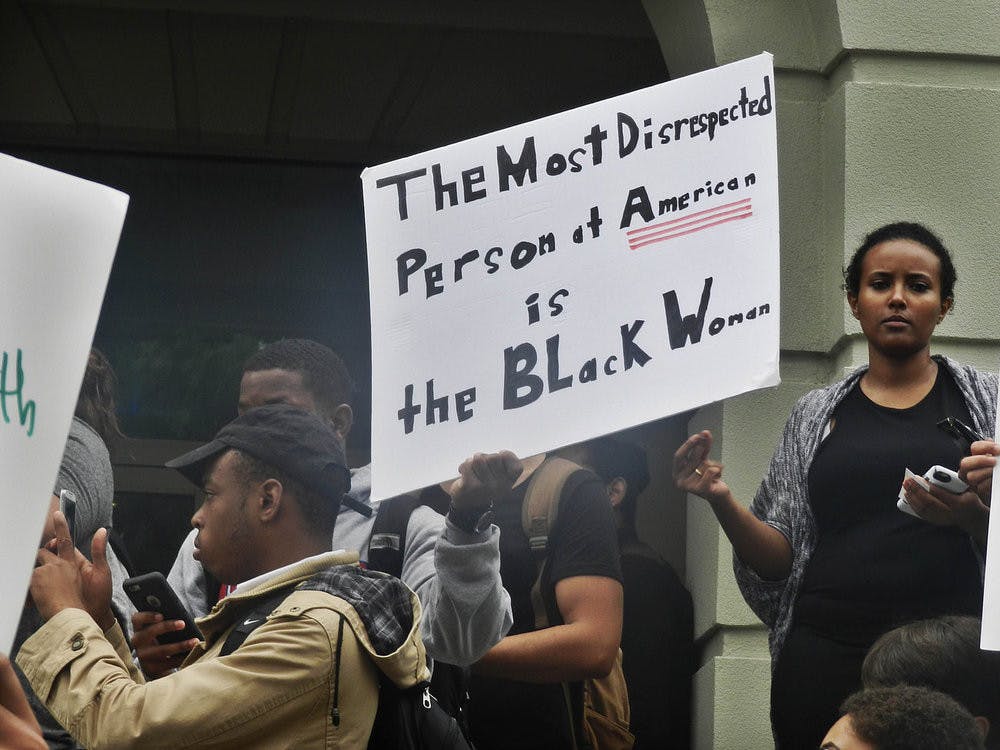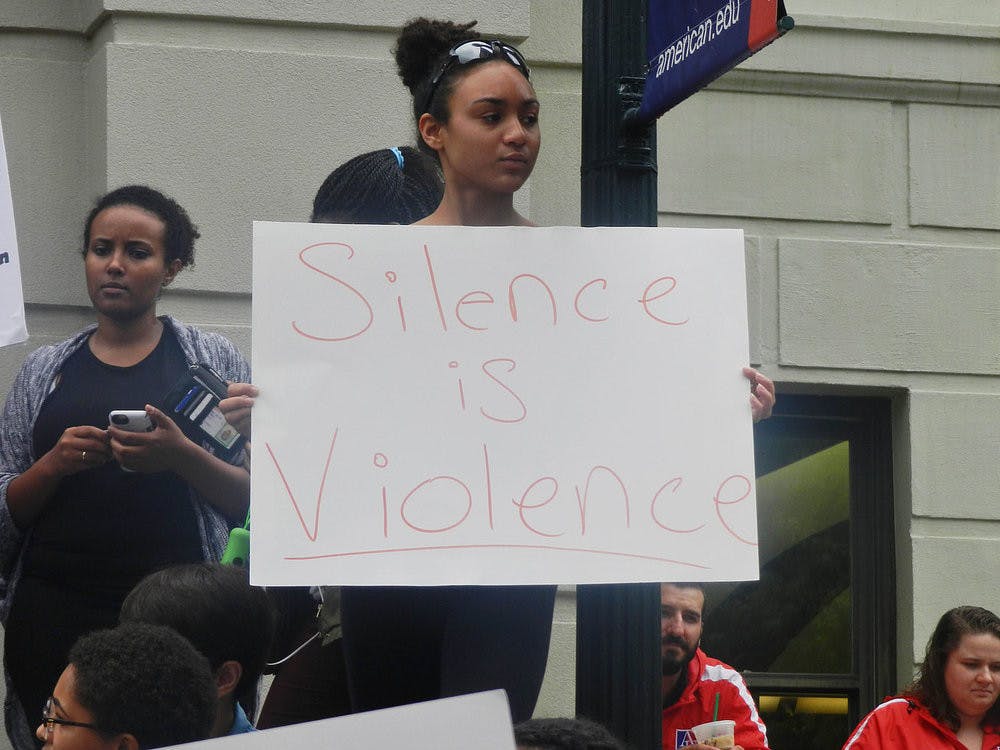BY: ELISHA BROWN & TARYN DANIELS

The atmosphere on campus lately can be summed up into four words: a storm is coming.
Yesterday afternoon, hundreds gathered at the steps of Mary Graydon Center to protest the recent racist incidents on campus. Both cases called into question how American University treats and cares for its black female students.
Criticism of the university reignited on Thursday when reports surfaced that black freshmen women were being targeted with rotten bananas thrown outside their doors and explicit images drawn on their white boards. The incident was picked up by national news outlets, and the Black Student Alliance called on the administration to take further action when it comes to addressing racism on campus.
"The feeling that Black students carry of being unrepresented, unprotected, and unappreciated can no longer be the status quo," said BSA in a statement released on Friday. The organization also urged the university to prove that it values diversity and inclusion following the racist incidents on campus. Finally fed up with the university's inaction, the alliance led Solidarity with Our Sisters.

The BSA-led event drew in AU students from all races and ethnicities who showed their support for the black female students on campus. The protest served as an open space for students and student leaders of color to air their grievances about how these incidents have been treated, as well as share personal stories about overcoming adversity on campus.
"You sold us on ‘this is going to be a diverse and inclusive campus.' We want you to hold up your end of the bargain and provide action when that statement is being trumped upon," said Othniel Harris, BSA Vice President. The sophomore also told us that direct action from the university would include a serious investigation and hiring more non-white faculty members. Harris said he has "no role models" here as a black Political Science major.
Judy Hasty was one of the many first-year black women at the event. It's only been the first few weeks of school and she is already the target of microaggressions from her white peers. Hasty told us about a time she went to the zoo with one of her friends, a white male. When they approached the ape exhibit, he said, "Look, it's your cousin."
"I brushed it off, because if I get mad, I'm a mad black girl," said Hasty. The young woman has relied on a group chat with the new black women students on campus as a tool of support.

The general consensus was one that we are all too familiar with -- as students of color, we earned the right to be here. We won't sit here in silence and ignore this situation, when so many of us don't even feel like this is a safe environment to learn and grow in. This is so much more than just an issue of bananas and obscenities, this is about restructuring the system.
"I definitely feel as if there's going to be individuals who are never going to be as marginalized as you will be as a black man, as a black woman, black LGBT anything in this country. For those people, it's difficult to explain. Because we're not attacking them, we're attacking the system that teaches them to put us down," said Levi Poe, a Howard University sophomore.
Students from other local universities also showed their support.
"As a [black] woman at a PWI, we're paying the same amount of money as everyone else. We're all extremely educated. It's no reason that people can't respect each other and have a level of maturity...and for the administrative position not to do anything is completely unacceptable," said Imani Ross, a sophomore at George Washington University, who also attended the event.
Never has it been more refreshing to see such a large movement on campus dedicated to bettering the treatment of black women, not only here at AU but also in the world. To be black is to be undervalued. But to be black women? It's a whole different ball game. We are black women first, journalists second. We started this site as a space to uplift students of color on campus. Watching events unfold over the last week has left us uncomfortable and disappointed.
We at The Blackprint call on the university to reassess the tools and strategies used to foster a diverse community on campus. We ask that there be subsequent actions taken against those who terrorize their fellow student body members based on the color of their skin. True inclusivity takes time and requires equal amounts of effort from the white student body and administrators. Uncovering, publicizing and questioning privilege and racism on campus should not rest entirely on students of color.
So this is for all the black women on campus. Stay strong. We stand with you.
All photo credit goes to Taryn Daniels


